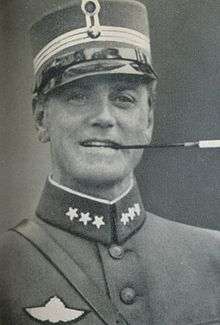Tancred Ibsen
| Tancred Ibsen | |
|---|---|
|
Tancred Ibsen | |
| Born |
11 July 1893 Gausdal, Oppland, Norway |
| Died |
4 December 1978 (aged 85) Oslo, Norway |
| Occupation | Film director, screenwriter, officer, and pilot |
| Spouse(s) | Lillebil Ibsen |
| Children | Tancred Ibsen, Jr. |
| Parent(s) | Sigurd Ibsen and Bergljot Bjørnson |
Tancred Ibsen (11 July 1893 – 4 December 1978) was a Norwegian officer, pilot, film director and screenwriter.
He was the son of Sigurd Ibsen, and the grandson of Henrik Ibsen and Bjørnstjerne Bjørnson. He was married to dancer and actress Lillebil Ibsen. His son Tancred Ibsen, Jr. (1921–2015) was a Norwegian diplomat.
Aviation career
In 1917, Tancred Ibsen started his career in the Army at the Norwegian Army Air Service and started the training for pilot at Kjeller Airport.
Not content with his military career, he started the first civilian active airplane company, A/S Aero in 1920, financed by his uncle, businessman Einar Bjørnson, and two shipowners. The company successfully operated demonstration, advertising, and limited mail flights with Tancred Ibsen as the head pilot. The company also chartered airplanes to the Det Norske Luftfartrederi routes in southern Norway. Ibsen soon tired of his career as a pilot, and the activity of A/S Aero ended, with the company becoming part of the aircraft factory in Tønsberg, A/S Norske Aeroplanfabrik. (When that company later went broke, it turned out that A/S Aero had never been formally registered as a limited company, leaving Ibsen personally liable for sizable debts. He managed a favourable settlement.)
Film career
A 1923 trip to New York and a screening of D. W. Griffith's Orphans of the Storm inspired Ibsen with the potential of filmmaking. He spent the next two years in Los Angeles, working at Metro Goldwyn Mayer as a handyman, electrician, and finally in the script department.[1]
Ibsen's return to Norway and directoral debut in 1931 was Norway's first feature-length sound film, Den store barnedåpen ("The Great Christening"). Through the 1930s he would "dominate" the nation's film industry,[2] with Leif Sinding in second place. Ibsen produced conventional melodramas more or less on the model of Hollywood films. In 1940 he returned to active military service against Operation Weserübung but continued to produce films through 1942.
After the war, Ibsen took on the project To mistenkelige personer ("Two Suspicious Individuals"), based on a 1933 book by Gunnar Larsen about a real-life 1926 killing. The completed film was banned by the Supreme Court of Norway, based on the privacy rights of one of the figures in the real-life killing, still alive.
Second World War
Ibsen was arrested by the German occupiers of Norway during the Second World War, on 17 August 1943. He was imprisoned in Schildberg and then Luckenwalde until the camp was liberated.[3]
Personal life
Ibsen was the son of Sigurd Ibsen, and the grandson of both Henrik Ibsen and Nobel laureate Bjørnstjerne Bjørnson. He married dancer and actress Lillebil Ibsen in 1919, and remained married to her until his death in 1978. His son Tancred Ibsen, Jr. (1921–2015) was a Norwegian diplomat.
His 1976 autobiography was called Believe It or Not.
Selected filmography
- 1931 - Den store barnedåpen (Director)
- 1933 - Men with Brooms (Writer, Director)
- 1934 - Op med hodet (writer, director), his wife Lillibel Ibsen starred in this play
- 1934 - Synnøve Solbakken (Director), based on the novel written by Bjørnstjerne Bjørnson
- 1935 - Kanske en gentleman (Director)
- 1935 - Du har lovet meg en kone (Writer, director, editor)
- 1936 - Ä vi gifta? (Dir)
- 1936 - Stackars miljonärer (Director)
- 1936 - Spöket on Bragehus (Director)
- 1937 - Fant (Director)
- 1937 - To levende og en død (Writer, Director, editor)
- 1939 - Valfångare (Director)
- 1939 - Gjest Baardsen (Writer, Director)
- 1940 - Tørres Snørtevold (Director)
- 1942 - The Dangerous Game (Director)
- 1948 - The private apartment (Writer, Director)
- 1950 - To mistenkelige personer (Writer, Director)
- Forbidden to be shown in public by the Supreme Court of Norway in 1952, legalized and published in 2007[5]
- 1960 - Venner (Director)
- 1963 - The Wild Duck (Director), written by Henrik Ibsen
References
- ↑ Nordic National Cinemas, edited by Gunnar Iverson, Astrid Soderbergh Widding, Tytti Soila, page 105
- ↑ Nordic National Cinemas, edited by Gunnar Iverson, Astrid Soderbergh Widding, Tytti Soila, page 105
- ↑ Ottosen, Kristian, ed. (2004). Nordmenn i fangenskap 1940–1945 (in Norwegian) (2nd ed.). Oslo: Universitetsforlaget. p. 336. ISBN 82-15-00288-9.
- ↑ "Ibsen, Tancred". Store Norske Leksikon. 7. Kunnskapsforlaget. 2005. p. 363.
- ↑ "Forbudt film frigjøres for offentligheten: To mistenkelige personer". Norwegian Film Institute. 29 January 2007. Archived from the original on 5 February 2007. Retrieved 20 June 2007.

